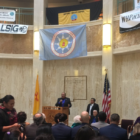2017 Legislative Session
Tax loopholes are in the eye of the beholder
|
Republican Gov. Susana Martinez continues to say we need to tighten our belts rather than raise taxes in order to solve our current fiscal crisis. “She will not raise taxes,” Chris Sanchez, the governor’s spokesperson, told New Mexico In Depth this week. Democratic Senate Majority Leader Peter Wirth, however, told the Santa Fe New Mexican this weekend the state can’t endure any more cuts and he is joined by lawmakers who favor raising new tax revenue to balance the budget and replenish the state’s reserve fund. On its face the two positions set up a battle over whether to cut expenses or to raise revenue. But it’s not so simple.



